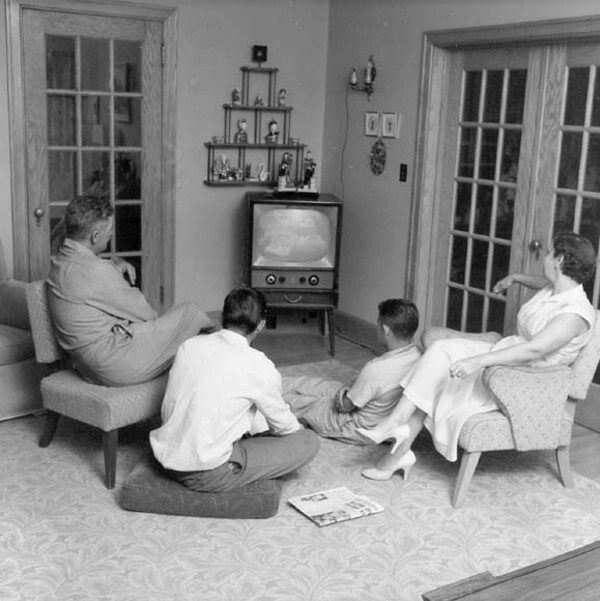
(Biblioarchives/Flickr)
If my travels on Twitter have taught me anything, it’s that sometimes, you’ll find yourself in a conversation that proves itself more interesting and valuable than the one you started with. And it can get you to think really hard about some of the things you’re already wrestling with.
(Most of those things, by the way, are not in the trending topics, which have too often been weaponized in ways meant to divide us.)
Such was the case on Tuesday night, when, in-between writing my piece on heart-shaped pizzas, I found myself engaged with a discussion on a somewhat questionable comment from smart person Ezra Klein, the founder of Vox and a New York Times columnist these days. He was reacting to a Chuck Klosterman interview that discussed how the ’90s were the last decade that had a true cultural touchpoint, and that things were aging less obviously. (For what it’s worth, I consider Klosterman’s Sex, Drugs, and Cocoa Puffs a significant influence on my own writing style.)
I argued that the latter point was almost entirely because of technology, pulling out my case about visuals and audio reaching a certain level of quality such that they don’t age themselves on their own. (Content from the ’90s doesn’t feel as old as content from the ’60s because fidelity increased significantly in a few decades and digital content degrades less obviously.)
But when graphic artist and all-around creative guy Rob Sheridan weighed in, the conversation went to a really interesting place. I think the key thing is that we are no longer collectively pulling from the same stream anymore. This is something I touched upon in my recent response to Ted Gioia, but having that point come up in natural conversation was a nice, fresh feeling.
The thing is, the mainstream is less mainstream than it was just a few decades ago. If you think of a television set in sort of the same light as a trending topics feed on a social network, then it starts to make sense. A TV dishes out topics to think about, to discuss, to engage with.
A great example of what this looked like was MTV. MTV, while it still played music videos, tended to influence popular culture by exposing everyone to the same few dozen songs every week. Those songs, inevitably, became our culture … a monoculture, as it were, because MTV eventually became the thing that broke new styles of music.
(I remember when MTV tried to sell us all on “electronica,” in kind of a force-feed format, in the early months of 1997. The Prodigy was great, but could you imagine that happening today?)
But over time, the TV began to dish out more topics, scattering our interests to touch upon slightly more elements of the human experience. You’re not going to have as fond an experience with some random sport fishing channel was you will with MTV or CBS, but the sport fishing channel is there because someone out there is into sport fishing. Basically, television evolved into an entertainment medium with multiple paths, but without a way to easily engage back.
Online culture is essentially this general idea on steroids, without anything to tether us all in—as well as the ability to engage. We can go any direction we want, and that means that we are less likely to all follow the same trends or be into the same types of creative things. And that means that there are fewer paths to monoculture.
We are not into the same things. In fact, we may be into things in which we’re the only people into them. Nothing’s stopping us from building culture from nothing, or from a limited number of elements.
But that means that the monoculture dies off—and you have to be willing to work to replace it with something else. (Many Olds aren’t, which is why oldies are popular.)
When there are deep cuts all over the internet, including at least one that tickles your fancy, why would you care about simply trying to build a collective cultural identity, just because? It’s the world’s problem, not yours.
(An old co-worker of mine, back in 2005 or so, described my cultural tastes as “off-the-grid,” which I think is probably the best compliment I’ve ever gotten.)
Honestly, I think that will eventually force us in an interesting direction; we will have a lot of people who are sort of famous, think along the lines of your favorite cult rock star from the ’90s, but fewer people filling up the top of the scrap heap.
The top of the scrap heap will feel like monoculture—after all, if you’re into Marvel or Star Wars, you can basically live your life engaging with only those two pop-culture properties and never catch some cool underground act out there somewhere.
But the underground will be there, and it will be interesting, and more people in the underground will make OK money doing what they want. No, they will not become like Bob Dylan or Bruce Springsteen or Neil Young and sell their catalogs for embarrassingly large sums.
However, they will get a more sustainable life, one less predicated on risk.
It will be better to have a world where a lot of creative people make $60,000 a year than a world where a few make half a billion in a single sale.
Monoculture doesn’t have to be the only way our culture takes in culture. Don’t forget that.
So anyway, thanks to Rob Sheridan for generating such a compelling discussion; you really got me thinking even harder about some things I was already thinking about.
Time limit given ⏲: 30 minutes
Time left on clock ⏲: 1 minute, 12 seconds



